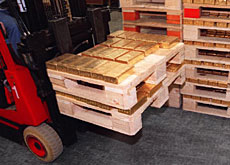NGOs want gold money spent on education

Eleven Swiss non-governmental organisations have called for a share of the proceeds from the national bank's excess gold reserves to be used for education.
The call comes after Swiss voters rejected two different proposals on the use of the gold reserves.
In a charter released on Monday, the NGOs proposed the money be spent on what they call “sustainable education”. The aim would be to make youngsters aware of the needs of ecology and development.
“The PISA survey shows that more has to be done to improve education,” said Karl Schuler, director of Greenpeace Switzerland. PISA takes a snapshot every three years of the knowledge and skills of 15-year-olds in the main industrialised countries.
The NGOs say improving education overall is not enough – they want specific ecological education at all levels of the school system.
“Research in particular should take into account innovative markets that are beneficial to the environment,” said Schuler.
The NGOs say the money, if made available, should be distributed equitably across the education system, and that care should be taken to make sure it does not fall into the pockets of specialised academics and institutions.
“The funds have to be used to answer the needs of everyone,” said Stéphane Montangero, president of the Swiss Federation of Youth Associations.
Rejected
The NGOs’ proposal comes after Swiss voters in September rejected two different suggestions on how spend the proceeds from the sale of 1,300 tons of gold, estimated to be in the region of SFr20 billion.
The government wanted to split the money evenly among the state pension scheme, the cantons and a “Solidarity Foundation” which was to support good causes at home and abroad.
A counter-proposal from the rightwing Swiss People’s Party, suggesting all the money should be spent on the state pension scheme, was also given short shrift by voters.
“Given the fact that voters saw no need to either of these proposals, we might as well make good use of this money and invest it wisely,” said Montangero.
“New poverty”
Beyond sustainable education, the NGOs also suggest that some of the money be used to fight what they call the “new poverty”.
“Even if poverty in Switzerland isn’t comparable to what you find in developing countries, its impact is just as devastating,” said Pierre Zwahlen, spokesman for Terre des Hommes.
Education can help beat poverty, according to Zwahlen. “We lack appropriate measures at the moment to help less qualified people,” he said.
“Bread for All”, the Swiss Protestant Churches development agency, also called for the authorities to ratify the International Labour Organisation’s 140 accord, which states that workers have a right to training.
The NGOs have submitted their proposal to the government, but are not hopeful that their ideas will become reality. “We would quite happy if the government took up just part of our proposal,” said Miriam Behrens, a spokeswoman for Pro Natura, the Swiss environmental organisation.
Far from the mainstream
Political analyst, Hans Hirter of Bern University, says the idea of sustainable education probably has a long was to go before it enters the mainstream.
“The under-30 generation tends to be less interested in politics,” he told swissinfo. “Because of this, political parties won’t find the NGOs proposal particularly attractive.”
He admits though that parts of it may filter through. “It may end up as part of the general educational propositions of the Radicals and the Social Democrats.”
As for sharing the gold money with the state pension scheme – the most likely beneficiary – the older generation seems quite happy with the idea.
“We believe the government pension scheme should be strengthened, and the money from the sale of the excess gold would help reach this goal,” said Martin Mezger, director of Pro Senectute, an organisation serving the elderly.
“But we don’t think all the money should go to pensioners,” he told swissinfo. “Part of it should go to the younger generation, education, or the environment for example.”
“What we don’t want is a generation gap.”
swissinfo

In compliance with the JTI standards
More: SWI swissinfo.ch certified by the Journalism Trust Initiative









You can find an overview of ongoing debates with our journalists here . Please join us!
If you want to start a conversation about a topic raised in this article or want to report factual errors, email us at english@swissinfo.ch.